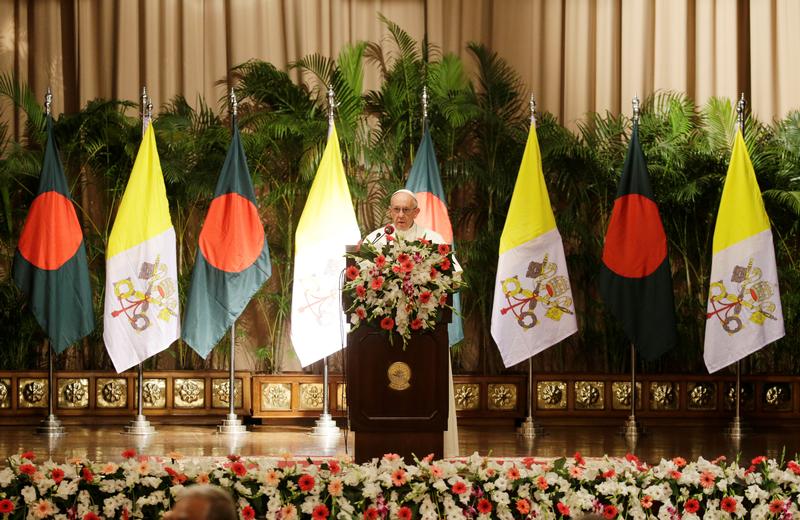DHAKA — Pope Francis called on Thursday for decisive measures to resolve the political reasons that caused mostly Muslim refugees in Burma to flee to Bangladesh and urged countries to help the Dhaka government deal with the crisis.
However, just as on the first leg of his trip, in Burma, he did not use the word Rohingya to describe the refugees, which is contested by the Burmese government and military.
In a speech before Bangladeshi President Abdul Hamid and diplomats hours after arriving under heavy security in Dhaka, the chaotic and dusty capital of 14 million people, Francis instead spoke of “refugees from Rakhine State.”
In his speech, Francis, who used the term Rohingya twice this year in appeals from the Vatican, praised impoverished Bangladesh’s “spirit of generosity and solidarity” in helping “a massive influx of refugees from Rakhine State.”
The exodus of some 625,000 Muslim Rohingya people from Rakhine State to the southern tip of Bangladesh was sparked by a military crackdown in response to Rohingya militant attacks on an army base and police posts on 25 August.
Scores of Rohingya villages were burnt to the ground, and refugees arriving in Bangladesh told of killings and rapes.
The United States has said the campaign by mainly Buddhist Burma’s military included “horrendous atrocities” aimed at “ethnic cleansing.” The military denies the accusations.
“None of us can fail to be aware of the gravity of the situation, the immense toll of human suffering involved, and the precarious living conditions of so many of our brothers and sisters, a majority of whom are women and children, crowded in the refugee camps,” Francis said at the presidential palace.
“It is imperative that the international community take decisive measures to address this grave crisis, not only by working to resolve the political issues that have led to the mass displacement of people, but also by offering immediate material assistance to Bangladesh in its effort to respond effectively to urgent human needs.”
Even though his calls for justice, human rights and respect in Burma were widely seen as applicable to the Rohingya, who are not recognised as Burmese citizens or as members of a distinct ethnicity, rights groups such as Amnesty International said they were disappointed he did not defend them by name.
In studiously avoiding the highly charged term, the pope has so far followed the advice of church officials in Burma, who feared it could set off a diplomatic incident and turn Burma’s military and government against minority Christians.
Francis is due to meet a group of Rohingya refugees in Dhaka on Friday.
In his address to the pope, the president of Bangladesh, which is predominantly Muslim, used the term Rohingya several times and accused the Burma Army of committing “ruthless atrocities.” He called for a “safe, sustainable and dignified return” of the refugees to their homes.
[related]
Burma and Bangladesh signed an accord last week on terms for the return of Rohingya, though rights groups are sceptical Burma will follow through on the deal and have called for independent observers for any repatriation.
There are concerns about protection for Rohingya from further violence if and when they go home, and about a path to resolving their legal status — most are stateless — and whether they would be allowed to return to their old homes.
The pope’s visit to the South Asian country unfolded under heavy security. While Francis stuck to his custom of using a simple car, he was escorted by many armoured military and police vehicles.
The country was shocked on 1 July 2016, when gunmen stormed a café in Dhaka’s upscale Gulshan neighbourhood, killing 22 people, most of them foreigners, in an overnight siege. Islamic State militants claimed responsibility.



